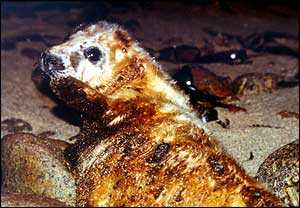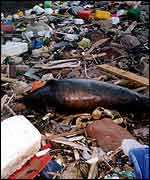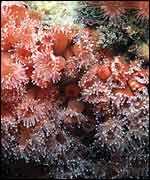|
It blames fishing practices for the plight of several small cetacean
species in UK waters:
•fishing for bass in the western English Channel by trawlers
operating in pairs, which in one recent study recorded 53 common
dolphins caught in 12 net hauls. The Trusts are campaigning for
the practice to be banned;
•the deep-water gill net hake fishery, using thin nets
floating just above the sea bed. The report estimates the harbour porpoise annual mortality this is said to cause around Cornwall at 6.2%, which it says is unsustainable;
•the use of monofilament gill nets, which the report says
"may have created a direct conflict with species such as the bottlenose dolphin";
•the introduction of "rockhopper" trawls, spring-loaded nets able to cope with previously undisturbed reef areas that are home to rare species like the pink seafan and the sunset coral.
The report says the number of dolphins drowned or injured in fishing nets is "dramatically increasing", with a record 500 animals stranded this year, most through contact with nets.
It says bottlenose dolphins off Cornwall have probably declined by almost two-thirds in the last ten years, with possibly only 350 left in UK waters. The species, it estimates, could become extinct here by 2012.
It also wants more protection for basking sharks, the sea's second largest fish at 10 metres in maturity.
And now that leatherback turtles are recognised as part of the UK's native fauna, rather than occasional vagrants, the report urges better protection for them from fishing gear.
|


